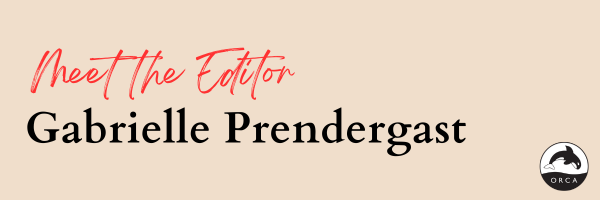Get to know Orca’s hi-lo editor, Gabrielle Prendergast, including what she’s looking for in new manuscript submissions!
Many years ago, I started reading Orca books while I was doing my MFA at the University of British Columbia. I loved Orca’s focus on striving readers, Canadian authors and politically progressive subject matter. So, when I finished my first YA novel, I was over the moon when Orca offered to publish it. Since that first book, working with Orca has been one of the great joys of my publishing life, and taking on the role of editor for Orca’s hi-lo series felt like a natural progression.
What are you looking for in a hi-lo manuscript?
Acquiring for Orca’s Currents, Soundings and Anchor lines of hi-lo fiction, my first concern is the needs of our readers. I’m looking for clear, concise writing for lower reading levels (grades 1 and 2 for Anchor, 2 to 5 for Currents and 2 to 4.5 for Soundings) with fast-paced linear plots, single protagonists and PG to PG+ language.
That said, the books need to be readable AND appealing to our target group, so I’m very drawn to titles that vibe with what tweens and teens are currently into. And because these are hi-lo books, and quite different from the rest of the genres in kidlit publishing, pitches and manuscripts that are closely comparable to popular published teen books are welcome. I’d love a hi-lo akin to Heartstopper, One of Us Is Lying or The Hate U Give, as well as anything that resembles TV shows like The Last of Us, Never Have I Ever or Reservation Dogs, video games like Fortnight or Minecraft, popular horror or action movies or even social-media celebrities. Currents submissions should appeal to middle-grade readers, aged 9-13, while Anchor and Soundings submissions should appeal to teens aged 12+.
Themes such as homelessness, climate change, refugees, mental health, discrimination and bullying continue to be appealing. I’m especially keen to incorporate these themes in a range of other popular genres, such as sci-fi, horror, fantasy, mystery, action, adventure or romance.
Finally, our readership is as diverse as the Canadian youth population—very. I’m keen to get submissions from authors from racially, ethnically and culturally diverse backgrounds, authors with disabilities, LGBTQ+ authors and authors from religious minorities, as well as submissions that incorporate many forms of diversity in their casts. For now, I prefer plots that hinge on some particular identity to be written by someone who shares that identity.
What are your favorite books?
- The Folk of the Air series by Holly Black
- The Murderbot series by Martha Wells
- The Life I’m In by Sharon Flake
- Boy Toy by Barry Lyga
- The Lesser Blessed by Richard Van Camp
- Cat’s Eye by Margaret Atwood
- The World According to Garp by John Irving
- Love That Dog by Sharon Creech
- Unwind by Neal Shusterman
- The Vampire Chronicles by Anne Rice
- The Taking of Jake Livingston by Ryan Douglass
- The Chrysalids by John Wyndham
- The Hunger Games by Suzanne Collins
- Simon vs. the Homo Sapiens Agenda by Becki Albertalli
- Klara and the Sun by Kazuo Ishiguro
- Frankenstein by Mary Shelley
- More Happy Than Not by Adam Silvera
- The Shadow Sister by Lily Meade
Plots and themes on my Insta-read: ROBOTS; romance; feminism; atheism; dystopia (real or imagined); vampires; aliens; fairies and magic; traditional myths and legends from any culture; any Indigenous themes; any kind of artificially created intelligent life, such as clones, androids, golems, etc.; winter/wilderness survival; evolution or anything about prehistoric life, such as dinosaurs, Neanderthals, etc.; incidental neurodivergence or other disability; confinement or forced proximity; enemies to love/friends; addiction; juvenile justice; cats; and crafting. I’m also a huge fan of alternative formats: verse, epistolary, etc. Also, ROBOTS—LOL.
What format should manuscripts be submitted in?
For hi-lo submissions from new authors, I would like a 200–300-word pitch, a chapter outline (one or two paragraphs per chapter) and three sample chapters (about 2000–3000 words). Existing Orca hi-lo authors can submit a 200–300-word pitch. I may or may not ask for a chapter outline or more details. Experienced authors who have NOT written hi-lo before can submit a 200–300-word pitch and ONE sample chapter to demonstrate a grasp of hi-lo expression.

